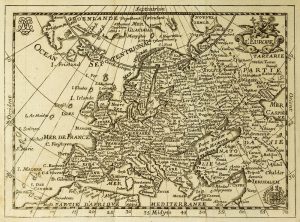
In the summer of 1627, corsairs from the Barbary Coast sailed about 3,000 miles to Iceland, killed or captured nearly 400 people, and took their captives back to North Africa to sell as slaves. Ólafur Egilsson, a 65-year old Icelandic Lutheran pastor, was taken in the raid, along with his wife and children. The Travels of Reverend Ólafur Egilsson is his first-person account of how he survived the raid and its aftermath, written after his return to Iceland in 1628.
Why did he return home? Once the Icelanders reached Algiers, Reverend Ólafur’s captors ordered him to travel back through Europe to petition the King of Denmark – Iceland’s colonial ruler at the time – for ransom money. The corsairs frequently tried to extract ransom from governments, institutions or wealthy individuals. If they succeeded, they had income; if not, they still had slaves. In this case, Reverend Ólafur was forced to leave his wife and children behind and undertake this journey alone, with no funds, guide or protection.
A story of survival and discovery…
In addition to a description of his remarkable journey, The Travels also contains observations about daily life in early modern Europe and North Africa as seen by an educated but provincial traveler. At a time when knowledge of the world beyond one’s own village or area was frequently minimal, writing this account was a way for Reverend Ólafur to teach Icelanders (for whom literacy has always been virtually universal) about distant lands, customs and peoples.
The final element of Reverend Ólafur’s story is faith. His tale makes clear the scope of the national tragedy for Icelanders (the raids resulted in the death or enslavement of close to 1% of the entire population of the country at the time), and the depth of the personal tragedy for him (at the time he wrote it, he did not know the fate of his enslaved wife and children). Thus, each chapter of the narrative moves between these three themes: the details of his captivity, the unfamiliar things he saw and experienced in his travels, and the Scriptural foundations that gave him the strength to endure. The alternation between these three elements gives each chapter of The Travels an emotional rhythm and flow that must have been both familiar and comforting to its original 17th century Icelandic audience.
…Now available to a larger audience…
Until recently, The Travels has only been available in the original Icelandic, or in Danish translation. Thanks to the efforts of Karl Smári Hreinsson, translator, and Adam Nichols, editor (@Prof_A_Nichols), it is now available in English. In addition to Reverend Ólafur’s account itself, the current English edition also includes extensive background material about Icelandic life and language, North African history, and the intellectual conflicts (for example, the growing rift between science and religion) that formed the backdrop for the early modern period in Europe.
…And still relevant today
I am delighted to have been chosen by the audiobook rights holder, University Press Audiobooks, to narrate this book. Both the story and the historical context are interesting in their own right. And some of the themes discussed, e.g. the tension between science and religion, are clearly applicable to our world today.
The audiobook is now available on Audible and iTunes, and I would like to give away ten promotional codes for free downloads of the audiobook from Audible. If you would like a promo code, please email me at bruce@nullkramervox.com. And if you can also review the book on Audible, I would appreciate it. First come, first served for the promo codes.
See, it’s always good to read the entire blog!